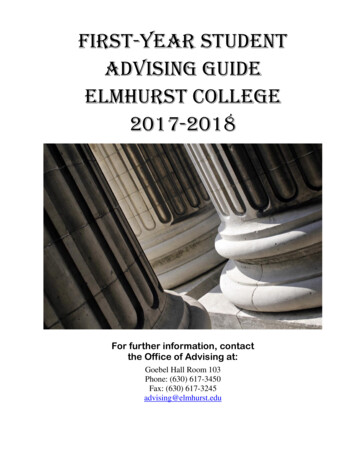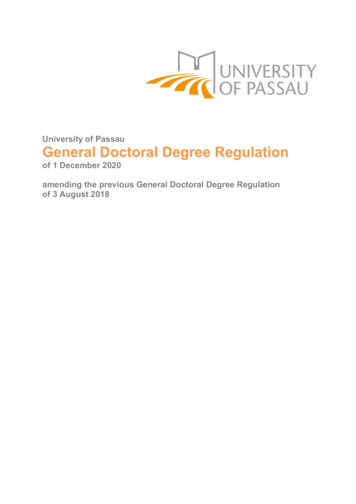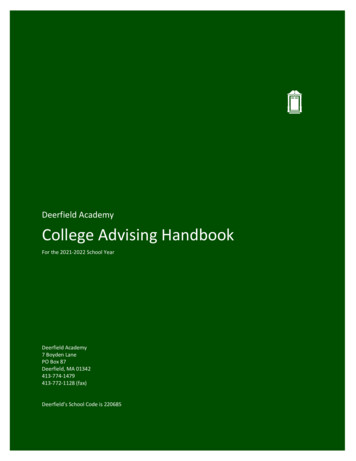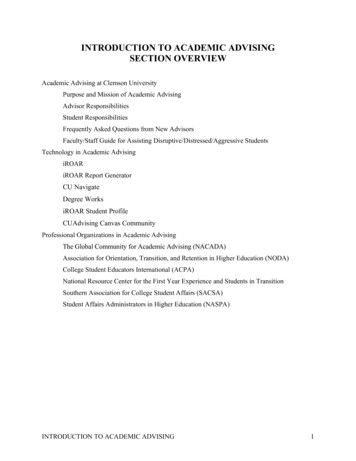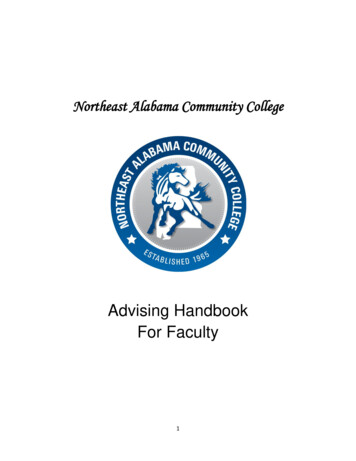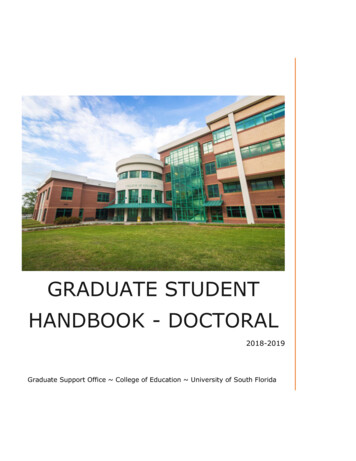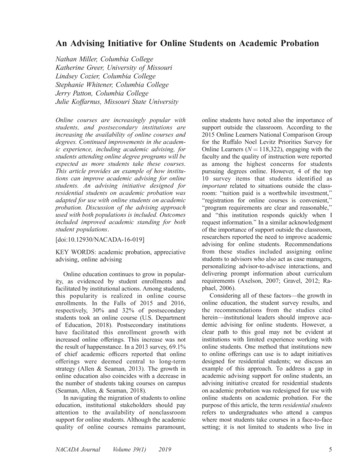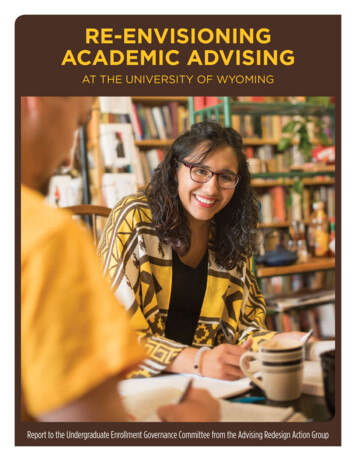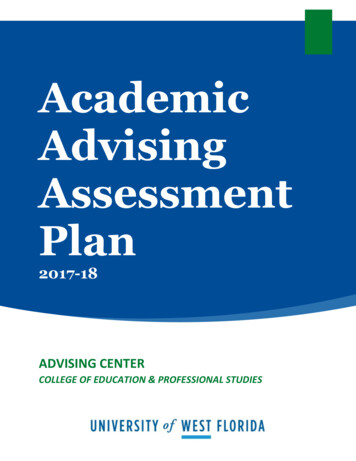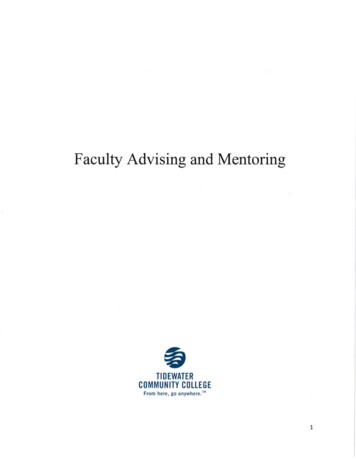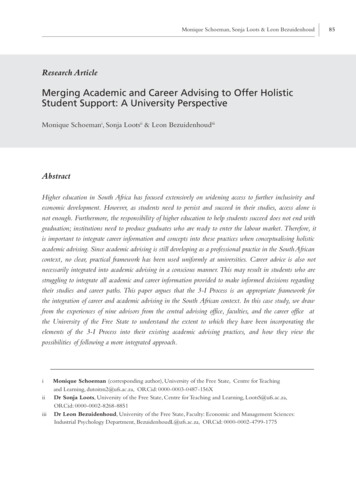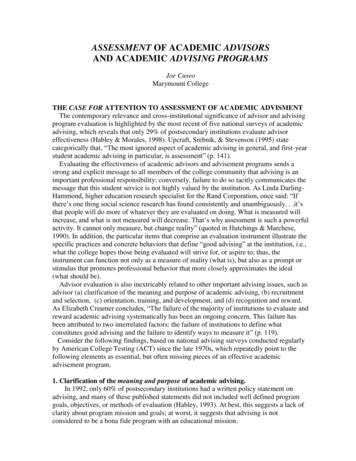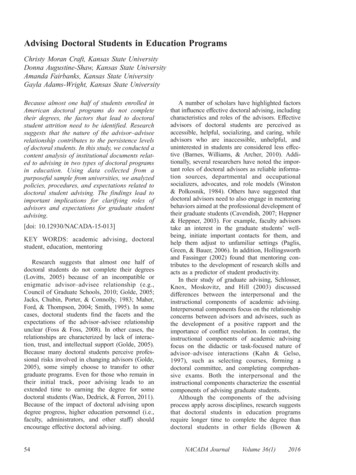
Transcription
Advising Doctoral Students in Education ProgramsChristy Moran Craft, Kansas State UniversityDonna Augustine-Shaw, Kansas State UniversityAmanda Fairbanks, Kansas State UniversityGayla Adams-Wright, Kansas State UniversityBecause almost one half of students enrolled inAmerican doctoral programs do not completetheir degrees, the factors that lead to doctoralstudent attrition need to be identified. Researchsuggests that the nature of the advisor–adviseerelationship contributes to the persistence levelsof doctoral students. In this study, we conducted acontent analysis of institutional documents relat ed to advising in two types of doctoral programsin education. Using data collected from apurposeful sample from universities, we analyzedpolicies, procedures, and expectations related todoctoral student advising. The findings lead toimportant implications for clarifying roles ofadvisors and expectations for graduate studentadvising.[doi: 10.12930/NACADA-15-013]KEY WORDS: academic advising, doctoralstudent, education, mentoringResearch suggests that almost one half ofdoctoral students do not complete their degrees(Lovitts, 2005) because of an incompatible orenigmatic advisor–advisee relationship (e.g.,Council of Graduate Schools, 2010; Golde, 2005;Jacks, Chubin, Porter, & Connolly, 1983; Maher,Ford, & Thompson, 2004; Smith, 1995). In somecases, doctoral students find the facets and theexpectations of the advisor–advisee relationshipunclear (Foss & Foss, 2008). In other cases, therelationships are characterized by lack of interac tion, trust, and intellectual support (Golde, 2005).Because many doctoral students perceive profes sional risks involved in changing advisors (Golde,2005), some simply choose to transfer to othergraduate programs. Even for those who remain intheir initial track, poor advising leads to anextended time to earning the degree for somedoctoral students (Wao, Dedrick, & Ferron, 2011).Because of the impact of doctoral advising upondegree progress, higher education personnel (i.e.,faculty, administrators, and other staff) shouldencourage effective doctoral advising.54A number of scholars have highlighted factorsthat influence effective doctoral advising, includingcharacteristics and roles of the advisors. Effectiveadvisors of doctoral students are perceived asaccessible, helpful, socializing, and caring, whileadvisors who are inaccessible, unhelpful, anduninterested in students are considered less effec tive (Barnes, Williams, & Archer, 2010). Addi tionally, several researchers have noted the impor tant roles of doctoral advisors as reliable informa tion sources, departmental and occupationalsocializers, advocates, and role models (Winston& Polkosnik, 1984). Others have suggested thatdoctoral advisors need to also engage in mentoringbehaviors aimed at the professional development oftheir graduate students (Cavendish, 2007; Heppner& Heppner, 2003). For example, faculty advisorstake an interest in the graduate students’ well being, initiate important contacts for them, andhelp them adjust to unfamiliar settings (Paglis,Green, & Bauer, 2006). In addition, Hollingsworthand Fassinger (2002) found that mentoring con tributes to the development of research skills andacts as a predictor of student productivity.In their study of graduate advising, Schlosser,Knox, Moskovitz, and Hill (2003) discusseddifferences between the interpersonal and theinstructional components of academic advising.Interpersonal components focus on the relationshipconcerns between advisors and advisees, such asthe development of a positive rapport and theimportance of conflict resolution. In contrast, theinstructional components of academic advisingfocus on the didactic or task-focused nature ofadvisor–advisee interactions (Kahn & Gelso,1997), such as selecting courses, forming adoctoral committee, and completing comprehen sive exams. Both the interpersonal and theinstructional components characterize the essentialcomponents of advising graduate students.Although the components of the advisingprocess apply across disciplines, research suggeststhat doctoral students in education programsrequire longer time to complete the degree thandoctoral students in other fields (Bowen &NACADA JournalVolume 36(1)2016
Advising Doctoral StudentsRudenstine, 1992). In fact, between 1980 and2006, the median duration between starting andcompleting graduate school increased from 10.7 to12.7 years for doctoral students in education fieldscompared to 7.7 to 7.9 years for doctoral studentsin all fields (Hoffer, Hess, Welch, & Williams,2007); this time frame includes that time necessaryfor completing master’s degrees prior to earningdoctoral degrees. Some reports estimate theattrition rate for doctoral students in educationprograms to be as high as 70% (Nettles & Millet,2006). Because research suggests that educationstudents experience consistently high attrition ratesand extraordinary long time-to-degree rates, grad uate advisors need to better understand advisingexpectations of and effective practices for support ing doctoral students in education programs.We undertook this qualitative study to under stand the roles and expectations for doctoraladvising as communicated through universitydocuments accessible via the Internet. To thatend, we analyzed written policies, procedures, andexpectations related to advising in K-12 andHigher Education PhD programs.useful method for ‘‘identifying, organizing, index ing, and retrieving data’’ (Berg, 2004, p. 225) andmay include investigating both manifest and latentcontent. Manifest content refers to ‘‘elements thatare physically present and countable,’’ while latentcontent refers to an ‘‘interpretive reading of thesymbolism underlying the physically presenteddata’’ (Berg, 2004, p. 229). In this study, weanalyzed both the manifest and latent content of thedocuments selected for inclusion.Conceptual FrameworkConcepts explained in some of the literatureabout role expectations form the framework of thisstudy. According to Reina and Reina (2006),individuals enter relationships with explicit andimplicit expectations. Failure to satisfactorilynegotiate implicit expectations can result instrained relationships, misperceptions about theintent of inquiry or advice, and program attrition(McCormack, 2005). In the realm of advisor–advisee relationships, unacknowledged expecta tions—those unarticulated by the doctoral adviseesor unmet by the advisor—can create a barrier topositive multiyear relationships (Harding-DeKam,Hamilton, & Loyd, 2012). Therefore, explicit,research-informed role expectations about doctoraladvising must be disseminated in the process ofdeveloping positive advisor–advisee relationships.Sample SelectionIn 2004, the Council of Graduate Schoolsinitiated the PhD Completion Project, a study toidentify interventions designed to increase PhDcompletion rates (Council of Graduate Schools,2010). Funding was provided to 21 private orpublic U.S universities, hereafter the researchpartners, classified as either research/high orresearch/very high according to the CarnegieClassification of Institutions of Higher Education(2015). All of the research partners agreed toprovide baseline completion and attrition data andto create and pilot interventions aimed atimproving completion rates and reducing attri tion.The research partners represent the demo graphic diversity of doctoral education in theUnited States from all regions. A total of 239departments and programs across these 21universities participated in the project. To identifydocuments for this study, we looked at theprograms featured by the 21 research partnersbecause of their commitment to improvingdoctoral student advising. In particular, we chosea sample of doctoral programs in each of 12institutions that offered at least one of the twoeducation programs of interest (see Table 1). Nineof the 12 institutions in the sample are land-grantuniversities, and 2 are among the 20 largestuniversities in the United States (U.S. Departmentof Education, National Center for EducationStatistics, 2015).MethodIn this study, we addressed the researchquestion: What roles and expectations for doctoraladvising are communicated through universitydocuments accessible via the Internet? To answerthe research question, we designed and conducteda content analysis of institutional documents aboutdoctoral advising in two types of educationprograms: the PhD in K-12 Education and thePhD in Higher Education. A content analysis is aData CollectionWe reviewed the web sites of the 12 sampleinstitutions to identify the documents for thestudy. We aimed to analyze every institutionaldocument available on the Internet that providedinformation about doctoral advising in the twoeducation programs of interest. We chose not tocontact institutions for additional information,because we wanted to base our study only ondocuments readily accessible to all graduateNACADA JournalVolume 36(1)201655
Craft et al.Table 1. Institutions and doctoral programsInstitutionFlorida State UniversityMarquette UniversityMichigan State UniversityNorth Carolina StateUniversityOhio State UniversityPennsylvania State UniversityPurdue UniversityUniversity of California, LosAngelesUniversity of GeorgiaUniversity of Illinois atUrbana-ChampaignUniversity of MichiganUniversity of MissouriProgramHigherK-12 EducationXXXXXXXXXXXXXXXXXXXXstudents and their faculty advisors. We lookedonly at documents created by either facultymembers or administrators at the sample univer sities and excluded resources referenced on orlinked to web sites created by outside entities(e.g., guides about mentoring that were created byother educational organizations).The specific documents that we collected fromwithin the selected programs included depart mental bylaws or other departmental documentsoutlining faculty or graduate student expectations(n 14); college-level graduate student hand books (n 6); university-level graduate facultyhandbooks (n 4); and university-level graduatestudent handbooks (n 10). The final data setconsisted of 52 single-spaced, printed pages oftext referencing the topic of interest drawn from1,600 pages of handbooks and bylaws accessedfrom 61 different web sites. From the 52 pages oftext, we analyzed 451 individual statements (i.e.,a couple of sentences or one short paragraphfocused on one relevant topic of interest).Data AnalysisIn the first step of the analysis process, weindependently reviewed the data and recordedobservations about it. After discussing theobservations, we followed Weber’s (1990) guid ance for examining qualitative content by usingan inductive analysis of the data. We developedan initial scheme with the following codes:selection of faculty advisor, process of changing56advisors, written expectations of doctoral stu dents, written expectations of academic advisors,and faculty accountability for advising.After we met as a group to discuss the firstround of coding, we realized that we needed tolook more deeply into the data. To that end, weutilized the literature related to the interpersonaland instructional components of doctoral advising(e.g., Schlosser et al., 2003) to create a secondcoding scheme for analyzing the data. Thatsecond coding scheme included eight individualcodes based on concepts related to eitherinterpersonal or instructional components ofadvising. For instance, the phrase faculty respon sibility for regular meetings with students de scribes one of the codes related to the interper sonal components of advising.After the second round of data analysis, welooked for themes that emerged from an overallanalysis of the coded data. During this process,we employed several techniques. First, we usedthe constant comparative method (as per Glaser &Strauss, 1967) to compare each new code with thetext assigned to it. We also used a word-basedtechnique to identify emergent themes (as perD’Andrade, 1995) by analyzing salient wordrepetitions (e.g., mentor and advisor). In the finalstages of identifying emergent themes, wesearched for information that we expected to findin the data but seemed to be missing from it.According to Ryan and Bernard (2003), muchcan be learned from a text, including assumptionsof the writers, by the information not included inthe write-up. With the use of the above tech niques, we identified five overarching themesfrom the analysis.TrustworthinessWe used several important strategies toincrease the trustworthiness of this study. First,we analyzed the data until we reached the point atwhich no new themes emerged; Strauss andCorbin (1990) referred to this as ‘‘theoreticalsaturation’’ (p. 188). By setting the stoppingpoint, we were less likely ‘‘to move beyond theface value of the content in the narrative,’’ andthus engage in ‘‘premature closure’’ (Wilson &Hutchinson, 1990, p. 123).Second, we enhanced the credibility of thestudy by using analyst triangulation, whichinvolves having two or more people independent ly analyze the same qualitative data and comparetheir findings (Patton, 2002). With more than oneanalyst on the research team, we gained multipleNACADA JournalVolume 36(1)2016
Advising Doctoral Studentsperspectives and opportunities to challenge indi vidual biases. We also increased trustworthinessof the study by establishing an audit trail; that is,we documented all research decisions andactivities throughout the course of the project(as per Whitt, 1991).ResultsFive themes emerged from the data thatcommunicate roles and expectations of doctoralstudents and their advisors in the two types ofeducation programs we examined. The themeshighlight constraints in selecting and changingadvisors, the desire for research-interest congru ence as the assumed reason for student desire tochange advisors, the value placed on instructionover relationship in advising, confusion betweenadvising and mentoring, and the stronger emphasisplaced on accountability for student progress thanfor faculty advising.Constraints in Selecting and ChangingAdvisorsOne theme that emerged from the studyfocuses on the opportunity (or lack thereof) fordoctoral students to select their own advisor andto change advisors. Documents from the majorityof institutions (9 of 12) reflect a process by whichadvisors are assigned to doctoral students basedupon student matriculation into selected educa tion programs. This process is exemplified in thefollowing statement in the Doctoral Degree K-12Educational Administration Student/FacultyHandbook at Michigan State University: ‘‘Uponadmission to the doctoral program, students areassigned an initial faculty advisor’’ (2013, p. 8).Although the documents seem to suggest thatnone of the sample institutions offer a process bywhich new doctoral students select their advisorupon matriculation, documents from three of theinstitutions suggest that advisors are eitherassigned or selected. For instance, the Standards& Procedures for Graduate Study at UCLA(University of California, Los Angeles [UCLA],2015) document contains the following informa tion:At matriculation, a graduate student usuallyselects, or is assigned, a faculty adviser whoassists the student in program planning andcompleting degree requirements. Sometimesthis role is temporarily assumed by a facultyadviser assigned to the program as a whole.When a student’s master’s or doctoralNACADA JournalVolume 36(1)2016committee is established, the chair of thecommittee assumes the adviser’s role. (p. 4)Most of the documents in the study did,however, contain language about a doctoralstudent’s option to change advisors during thecourse of his or her graduate program. Interest ingly, such statements often featured cautionarylanguage, such as the following statement in theUniversity of Michigan (2015b) How to Get theMentoring You Want: A Guide for GraduateStudents document: ‘‘Seek the advice of a trustedfaculty member and other professional staff todetermine whether it is in fact desirable to changeyour advisor’’ (p. 17). Moreover, in most of thedocuments, the process outlined for changingadvisors was either not mentioned or explained invery vague language. For instance, according tothe Graduate School Bulletin from MarquetteUniversity (2013), ‘‘Students who want to changeadvisers should check with their department foradditional information and instructions’’ (p. 30).The University of Illinois at Urbana-Champaign(2015a) College of Education Graduate Hand book explains, ‘‘A change of advisers is handledwithin the student’s department’’ (¶2). Thecautionary and vague terms in these documentscommunicate the message that doctoral studentsmust seriously consider the decision to changeadvisors and need to be self-directed in deter mining the process.The Assumed Reason for Changing AdvisorsAnother theme in the study highlights anassumption made about the reason doctoralstudents might desire a change of advisors.Although they reflected existing processes fordoctoral students to change advisors, documentsfrom the institutions in this study communicatedprimarily one valid reason for doing so: incon gruence of research interests. For instance, theUniversity of Michigan (2015a) Doctor ofPhilosophy in Higher Education With a Concen tration in Public Policy in Postsecondary Educa tion Requirements contained the following state ment:As a student’s interests are honed withgained knowledge and experience, a changeof advisor may be in the student’s bestacademic interest. Faculty members workclosely together in an annual academicreview of student progress to ensure each57
Craft et al.student’s needs are being met and that allstudents are achieving progress towarddegree. (¶2)Similarly, the UCLA (1993) Policies andRecommendations to Improve Time-to-Degree inUCLA’s Graduate Degree Programs contains thefollowing statement:Throughout his or her entire graduateprogram, every graduate student shall havea faculty adviser (or faculty advisory com mittee) whose interests are as similar aspossible to those of the student. . . . As thestudent’s interests develop, he or she must beable to change advisers easily. (pp. 1-2)Interestingly, none of the documents found inour study communicate the possibility thatinterpersonal conflicts unrelated to researchinterests might motivate doctoral students tochange advisors. Although the following state ment from the University of Illinois at UrbanaChampaign (2015c) Graduate Student Appealsrecognizes the possibility of interpersonal con flicts between doctoral students and faculty otherthan their advisors, it implies that the relation ships between doctoral students and their advisorsare positive:Students who have a grievance should useinformal resolution before initiating a formalgrievance. Students in Education are encour aged to discuss the issue with the faculty orstaff member with whom the problem hasarisen. If a satisfactory solution is notforthcoming, the student should discuss theissue with his or her adviser. (¶8)Although a grievance process exists at theUniversity of Illinois at Urbana-Champaign, thepotential reasons for a grievance are notdescribed. Furthermore, and most relevant to thisstudy, the assumption inherent in the featuredwritten statement suggests that such a grievancemay relate to a faculty member other than thestudent’s advisor. The students are not given anyguidance about ways to resolve conflicts withtheir own advisors.Instruction Valued Over RelationshipAn additional theme that emerged from thedata reveals a stronger emphasis on the instruc 58tional components of advising than on theinterpersonal aspects of advising (Schlosser etal., 2013). To be specific, we found 247statements about the instructional componentsof advising, but of the 21 statements ofinterpersonal components of advising, 14 camefrom one institution (University of Michigan).An example of a statement focused on theinstructional components of academic advisingcan be found in The Ohio State University (2010)School of Educational Policy and LeadershipGraduate Studies Handbook:If the student and the student’s advisordetermine that an alternate multicultural orfoundation course would better meet theneeds of the student’s program, a petitionmay be submitted to the Graduate StudiesCommittee to allow an alternate course onthe plan of study. The petition should includea letter from the student explaining thechoice of an alternate course and a letter ofsupport from the student’s advisor explaininghow that course meets the criteria formulticultural courses as set forth by theGraduate Studies Committee, and a copy ofthe course syllabus. (p. 32)Another instructional component, the imple mentation of the preliminary examination, isdiscussed in a statement found within theUniversity of Illinois at Urbana-Champaign(2015b) Graduate College Handbook:The chair of the preliminary examinationcommittee must be a member of theGraduate Faculty. The committee chair isresponsible for convening the committee,conducting the examination, and submittingthe Preliminary Exam Result form to the unitin which the student is enrolled and to theGraduate College. (¶18)In contrast, an example of such a statementfocused on an interpersonal component ofadvising is as follows: ‘‘Graduate students andfaculty members share the responsibility formaintaining professional relationships based onmutual trust and civility’’ (Michigan StateUniversity, 2014, p. 4). The Pennsylvania StateUniversity (2014) University Bulletin providesanother example: ‘‘Continuing communicationamong the student, the committee chair, theNACADA JournalVolume 36(1)2016
Advising Doctoral Studentsdissertation/performance adviser, and the mem bers of the committee is strongly recommended,to preclude misunderstandings and to develop acollegial relationship between the candidate andthe committee’’ (¶33). In spite of the aforemen tioned examples, a paucity of statements charac terized our findings on the interpersonal compo nents of advising in the documents reviewed forthis study.Confusion Between Advising and MentoringAnother theme that emerged from the datareflects the inconsistency with which key termi nology was used throughout the documents. Inparticular, the wording did not effectively distin guish between advising or advisor and mentoringor mentor. Both forms of each term were used invarious places within the documents but withoutclear differentiation; in some cases, both termsappeared in the same sentence:All requests for conditional admission of anapplicant will be forwarded to the GraduateStudies Committee with letters of supportfrom the prospective advisor and the sectionchair. . . . The letters should also indicate thatthere is significant support within the sectionfor the student’s admission and that theassigned faculty advisor is willing to mentorthe student over and above normal advisingresponsibilities. (Ohio State University,2010, p. 8)Similarly, the following statement can befound in the UCLA Graduate Student AcademicRights and Responsibilities (2003) document:‘‘We will communicate regularly with facultymentors and advisers, especially in matters relatedto research and progress within the graduateprogram’’ (p. 2).In other cases, such as in the North CarolinaState University (2015) Department of Leader ship, Policy and Adult and Higher EducationReappointment, Promotion and Tenure Standardsand Procedures document, the term mentoringseems to describe the instructional components ofadvising:Teaching and mentoring graduate studentsrefers to developing innovative instructionalmaterials or new courses, supporting anddirecting graduate students to successfulcompletion of advanced degrees serving asNACADA JournalVolume 36(1)2016the chair or member on thesis or dissertationcommittees, and working collaborativelywith graduate students on research, teaching,or community-based projects. (¶10)The term advisor (adviser) was used as a noun219 times in the documents, and the term mentorwas used as a noun 14 times. Moreover, the termsadvise or advising used as a verb appeared 39times. The verbs mentor or mentoring appeared 8times within the documents from 9 of theinstitutions, but they appeared 53 times withinthe documents for the following institutions:University of Illinois at Urbana-Champaign,Florida State University, University of Michigan.More Accountability for Students Than forFaculty AdvisorsA different theme that emerged in this studyfocuses on the issue of accountability in doctoraladvising. The documents we analyzed empha sized the importance of holding doctoral studentsaccountable for making satisfactory progresstoward their degrees, but they provide minimalaccountability measures for specific facultyattitudes and behaviors that reflect effectiveadvising as described in the literature (e.g.,Barnes, Williams, & Archer, 2010).A number of the institutional documentscontain information for both advisors and doc toral students about expectations for students’continued progress toward their degrees. Forinstance, the University of Michigan (2015c)Rackham Graduate School Quick Tips forPromising Practices: Annual Review documentcontains the following statement: ‘‘Review stu dent progress one time per year. Annually assessstudent progress, set goals and identify mile stones. Require students to prepare progressreports in advance’’ (¶1-3). We found anotherexample on the University of Georgia Departmentof Lifelong Education, Administration, andPolicy (2015) web site:Department of Lifelong Education, Admin istration, and Policy graduate students rou tinely meet with their major professor(s) orother assigned advisors, including at leastonce per semester to discuss progress towardtheir degrees and their registration needs forthe following semester. All graduate studentsmust meet standards for satisfactory workand timely progress toward a degree, as59
Craft et al.specified in individual degree and programinformation by the department and by theGraduate School.The University of Missouri (2016) GraduateStudies Annual Review of Graduate StudentProgress contains this statement: ‘‘The GraduateSchool requires all master’s, education specialistand doctoral students to submit an annual reportof academic progress’’ (¶1).Despite the institutional documents that fea tured statements about accountability for doctoralstudents’ progress toward degree completion, fewmentioned the importance of the following withor for advisees: regular meetings with advisees(more than once a semester); professional devel opment, mentoring, or career guidance; develop ment of a positive relationship; healthy conflictresolution; or program guidance (Schlosser et al.,2003). The performance indicators for advisorsfound within departmental bylaws did not explainthe advising behaviors expected of the faculty:Performance Indicators for Promotion fromAssistant to Associate: A record of effectiveand sustained advisement of undergraduate,graduate, and postdoctoral students, andstudent organizations, as appropriate to one’sdepartment, position and standing. (Univer sity of Missouri, 2013, p. 5)Documents describing reviews of facultyadvising tend to reveal reactive rather thanproactive practice, and they advance the view point that audits are deemed necessary only at thediscretion of program leadership:The head of a graduate program may alsoinitiate a review at any appropriate time.Reviews may be appropriate when there areallegations against a graduate faculty mem ber of incompetence or negligence withrespect to graduate faculty duties, includingthe teaching, supervising, and mentoring ofgraduate students. (Purdue University, 2011,p. 4)More often than not, expectations related tofaculty advising of doctoral students are stated invague terms without any clear measurableoutcomes. For instance, the Policies and Recom mendations to Improve Time-to-Degree inUCLA’s Graduate Degree Programs explains:60All those involved in personnel actionsshould look favorably on evidence that afaculty member has been engaged andeffective as an adviser and mentor ofgraduate students and/or as a provider ofapprenticeship opportunities. Such facultywork should contribute to students’ timelyacquisition of the knowledge and skillsvalued in their degree program and is worthyof reward. (UCLA, 1993, pp. 3-4)As a result of broad generalized guidance, fewexternal incentives are offered as motivators forfaculty members to engage in behaviors charac teristic of effective advising (Barnes et al., 2010).DiscussionResearch has shown that doctoral advisors playa major role in a graduate student’s life (Heppner &Heppner, 2003; Holland, 1998). Advisor charac teristics appear to influence, at least in part,students’ overall attitudes about their doctoralexperience, the nature of the relationship that theyexperience or can experience with their advisors, aswell as their ability to make progress toward theirdegree program goals (Barnes et al., 2010). Severalsources reported unsatisfactory advisor–adviseerelationships as a primary cause of doctoral studentattrition (e.g., Council of Graduate Schools, 2010;Golde, 2005; Maher et al., 2004; Smith, 1995), andgraduate students in education programs leave athigher rates than those in other academic disci plines (Bowen & Rudenstine, 1992; Hoffer et al.,2007). Therefore, we analyzed the roles andexpectations for doctoral advising communicatedthrough university documents accessible via theInternet.The themes that emerged in this study commu nicate roles and expectations of doctoral studentsand their advisors in education programs that donot align with research findings concerningeffective doctoral advising. First, the data suggestthat, in most of the education programs included inthe sample, advisors are assigned to the studentsrather than being selected by students. Accordingto Fischer and Zigmond (1998), selection of anadvisor constitutes one of the first and mostsignificant decisions a graduate student makes.Other researchers have also found that the ability toselect an advisor can significantl
advisee relationships, unacknowledged expecta a sample of doctoral programs in each of 12 tions—those unarticulated by the doctoral advisees or unmet by the advisor—can create a barrier to . books (n 6); university-level graduate faculty handbooks (n 4); and university-level graduate student handbooks (n 10). The final data set .
